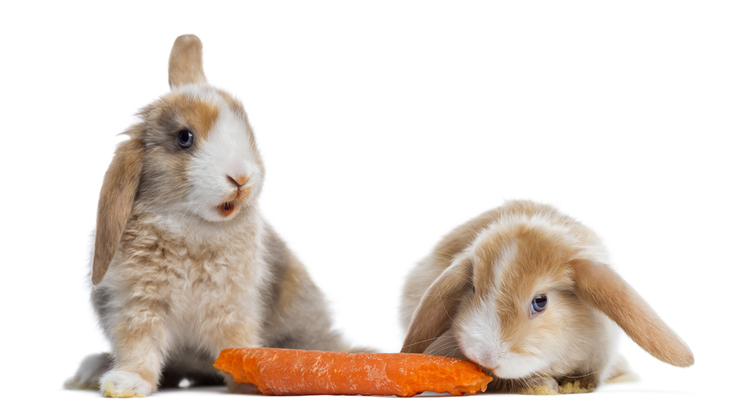Veggies for Your Critter

Honey Bunny knows when veggie time is coming and waits eagerly at the side of her cage. Hammie hoards those precious bits of apple in his little hidey-hole. Your guinea pig may even have learnt to squeak to you for its daily slice of carrot… But did you know which veggies and fruit will do more harm than good to your little friends?
Bunny Bites
Vegetables are a good source of fluid for bunnies, which is very important to keep the digestive tract moving. Give your rabbits a variety of vegetables. Rabbits have more taste buds than humans and they enjoy their food. Lettuce is fine, but only the darker varieties like romaine have enough nutrients.
Some rabbit owners are concerned about the calcium content of some vegetables, which may cause bladder and kidney problems in rabbits. However, pellets are a much higher source of calcium in the diet of the rabbit, and if calcium is an issue then cutting back on pellets will have much more of an impact than cutting back on vegetables.
Some vegetables can give rabbits soft stools, so try new vegetables one at a time. It is recommended to start with feeding a very small piece (a 1/2 inch slice of carrot or one sprig of parsley) of vegetable daily for three days. If there are no reactions or problems then it can be added to the daily diet. Over the course of a few weeks, more and more vegetables can be added, one at a time. As your rabbit’s system becomes accustomed to the fresh food you can offer more volume. Vegetables should be discontinued if any diarrhoea occurs.
Pigging Out
Guinea pigs are vegetarians that require many types of fruits, vegetables and greens. The staple of the guinea pig is hay, which should be fed to your pet several times daily. Timothy hay is the most nutritious choice for this animal, but any type of hay grass is fine as well. Specially formulated pellets, which give your pet a proper balance of vitamins and minerals, should also be given each day.
As guinea pigs cannot manufacture their own Vitamin C, fresh fruit and veggies forms an important component of their diet. There are a few things to watch though: spinach can upset some guinea pigs’ digestive systems, similarly the citrus fruits are too acidic and can damage their lips, leading to infection. Remember to make sure your guinea pig has fresh water and food daily. Any uneaten fruit or vegetables should be removed after a few hours to avoid it rotting, which may cause nasty smells and may even upset your guinea pigs’ stomach.
Hungry Hammies
Although hamster mixes will provide the hamster with a good basic diet, they also enjoy fruit and vegetables. However, it is important that fruit and vegetables should be introduced to a hamster’s diet gradually as a sudden large amount can cause diarrhoea.
To begin with, the hamster should only be given a small piece of fruit or vegetable once or twice a week. Over a period of a few weeks, this can be increased to a small piece every day. If at any time the hamster shows signs of diarrhoea, all feeding of fruit and vegetables should stop until the hamster has recovered. Gradually re-introduce fruit and veggies into its diet.
Feed your hamster once a day, in the late afternoon or evening. If any fruit and vegetables is left uneaten, give less the next day. If all is eaten, try giving more, but first check to see if your hamster is hoarding in its cage. Remember that fruit decays quickly, so check that none is left uneaten in the cage for more than a day. To make sure your hamster gets the vitamins it needs, supplement its diet with vitamin drops. Never leave your hamster without fresh water to drink.








